|
|
|
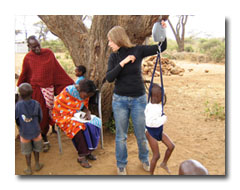 |
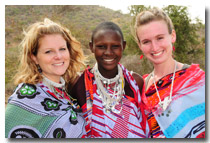
Sauti Moja is committed to raising awareness about the issues that are affecting the vulnerable communities that we work with. Concurrent to providing much needed financial and program assistance to vulnerable communities and families, we also want to foster understanding among Canadians and others about the challenges facing the people that we work with. We want to enhance others’ understanding about the environmental, social, cultural factors that contribute to the plight of our beneficiaries. In so doing, Sauti Moja hopes to mobilize people to support the changes that may foster a more just and equitable global community.
The Challenge
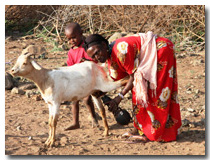 Too often, the plight of vulnerable communities in Africa is unknown or poorly understood. This is especially the case for the pastoralist communities in East Africa. Their diverse culture and livelihood are often misrepresented or misunderstood, and the roots of their challenges overlooked. This frequently compounds their problems and worse, leads to discrimination and prejudice. The pastoralists we work with are often considered a “backward” or “primitive” people, which leads to further marginalization and an erosion of their rights. More awareness creation is required to raise general understanding of the challenges facing pastoralists and, in so doing, mobilize the necessary support for them within East Africa and beyond. Too often, the plight of vulnerable communities in Africa is unknown or poorly understood. This is especially the case for the pastoralist communities in East Africa. Their diverse culture and livelihood are often misrepresented or misunderstood, and the roots of their challenges overlooked. This frequently compounds their problems and worse, leads to discrimination and prejudice. The pastoralists we work with are often considered a “backward” or “primitive” people, which leads to further marginalization and an erosion of their rights. More awareness creation is required to raise general understanding of the challenges facing pastoralists and, in so doing, mobilize the necessary support for them within East Africa and beyond.
|
|
|
“In 2008, I did an internship with Sauti Moja’s Tanzanian partner, LOOCIP, in Longido, Tanzania. While I don’t want to sound pretentious, I have to admit that this experience changed my life.
I used to be a Linguistics major, but after my time in Longido, I switched to Anthropology, which I continue to pursue at a Master’s level. With this education, I hope to work for international development programs, helping vulnerable communities around the World. The inspiring culture of the Maasai has helped me to make this choice.An internship with Sauti Moja meant a unique opportunity to see the beauty of the Maasai culture, to understand the hardships they encounter, and a chance to reflect on the direction of my own life.”
Laurens Bistervels – student from University College Utrecht
|
| |
|
|
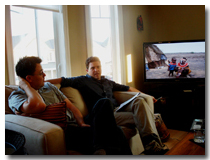 Disseminating written material to donors and supporters. Sauti Moja tries to engage and educate donors and supporters via frequent reports, updates, and brochures. Disseminating written material to donors and supporters. Sauti Moja tries to engage and educate donors and supporters via frequent reports, updates, and brochures.- Mass media. When opportunities arise, Sauti Moja publishes stories and info in newspapers, journals, or broadcasts them via radio and television.
- Presentations. Periodically, Sauti Moja conducts presentations in various venues to share information about the communities it works with and the programs it conducts. These range from informal gatherings in private homes, company offices, or churches to formal presentations at international academic conferences.
- Internet. The Sauti Moja websites and Facebook group offer opportunities to share information and resources via the internet, and to facilitate online discussions about important issues.
- University field study and practicum programs. Sauti Moja collaborates with several universities in support of field study programs and student internships, providing learning opportunities for students from all over the world.
- Hosting volunteers. When opportunities are available, Sauti Moja hosts local and international volunteers in Kenya and Tanzania so as to mobilize their technical support and concurrently raise their awareness.
- Facilitating immersion and awareness-raising visits. Several times a year, Sauti Moja welcomes donors, supporters and other interested individuals to the communities we work in, immersing them in the local culture and educating them about communities’ plight and adaptation to socio-economic and environmental challenges.
Our Achievements
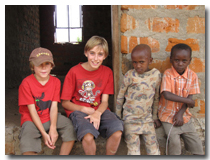 Up to three hundred people receive written reports, updates and other material from Sauti Moja annually. This number is expanding every year as our support base grows. Up to three hundred people receive written reports, updates and other material from Sauti Moja annually. This number is expanding every year as our support base grows.- Stories and information about our programs and the communities we work with have been published in newspapers throughout Canada, broadcasted via radio, and included in video productions. In one case, our HIV/AIDS program is featured prominently in a video that is being used throughout Tanzania and Kenya to mobilize Maasai communities to confront HIV/AIDS. Donors have had articles recounting their learning during visits to our projects published in Canadian newspapers.
- Presentations are conducted every year. Sauti Moja has conducted presentations for groups in almost every province across Canada. Presentations have included large meetings like the Interagency Coalition on AIDS and Development AGM, and international conferences, including the XVII International AIDS Conference in Mexico!
- A new website has been launched in 2010. This website caters to educating people and providing them more information about our programs and the people we serve and includes a list of learning resources.
- Sauti Moja collaborates with seven university student programs. While the list continues to grow, Sauti Moja has to-date collaborated with programs from Wilfrid Laurier University (Ontario), Lakehead University (Ontario), McGill University (Quebec), Dalhousie University (Nova Scotia), Wheaton College (USA), University College Utrecht (Netherlands), University Lueven (Belgium).
- Several volunteers have been hosted. Volunteers have been hosted in various positions relating to early childhood education, micro-business development, health, gender advocacy, and research. In one case, Sauti Moja Canada hosted a Loran Award volunteer, which is one of the most prestigious award programs for students in Canada.
Did you know?
Sauti Moja was privileged to be invited to the XVII International AIDS Conference in Mexico in 2008 to present the lessons it’s learned from its innovative HIV/AIDS program. The focus was on HIV/AIDS and indigenous people. Through these types of opportunities, Sauti Moja has a chance to promote better ways to mobilize communities to confront the epidemic.
|
|

- Join the LECHE Project which is affordable, supports healthy development of Maasai preschoolers, and helps educate your children.
- 1000 Widows Initiative – We’ve helped 161 vulnerable women become self-sufficient, so now we are targeting another 839 over the next three years! More
- Sponsors for child mothers are desperately needed! More
- Read about Sauti Moja’s role in famine recovery here.
- Read about Sauti Moja’s response to global warming here.
|
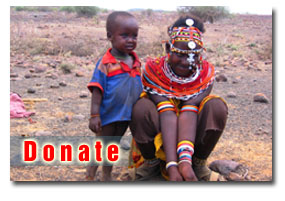 |
|
|
|